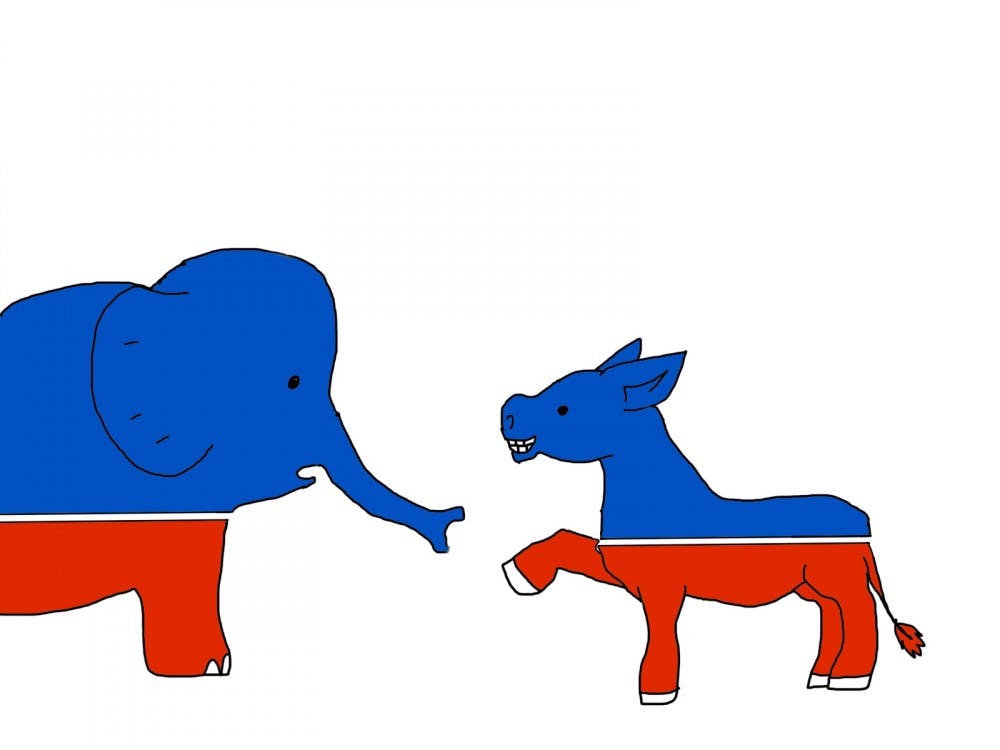While studying in Frist Campus Center one night, I overheard a conversation at a nearby table. A student was considering whether to take POL 315: Constitutional Interpretation. Ultimately, he decided against it. The reason? He disagreed with the political views of its professor — famed conservative Robert George — and thought that his work was “unscholarly” because of them.
My jaw practically dropped to the floor. Although I haven’t taken POL 315, I have watched George lecture on the Constitution in the James Madison Program. I too disagree with many of his views, but describing this man — who quotes Plato off the cuff — as “unscholarly” is akin to saying that the sky is purple. His picture is probably next to the definition of “scholar” in the dictionary. Supreme Court justices have cited his publications, and a New York Times writer called him “this country’s most influential conservative Christian thinker.” Never mind that his class has a 4.60 course rating, is described as “absolutely amazing” in reviews, and has produced renowned alumni across the ideological spectrum.
Such talk isn’t rare here. Nor is it confined to our class schedules. Political intolerance pervades student life at the University. When dealing with people and academics, we must look beyond our differences or else risk augmenting divisions in our already fractured campus community.
Politics are now a litmus test for the people with whom we interact. A friend once told me that her boyfriend wasn’t “woke enough,” so she dumped him. In another conversation, a different friend said of a prominent conservative classmate, “it’s horrifying that someone could be friends with him.” I guess that also makes me horrifying.
Unfortunately, my anecdotes aren’t isolated incidents. Instead, they are part of a larger national trend. Pew found that 63 percent of consistent conservatives and 49 percent of consistent liberals have friends that share their views. Their answers may be due to the fact that half and a third of them, respectively, say that it’s important to live around people who are politically similar to themselves. The sacred bond of marriage isn’t enough to ignore politics either. Almost a quarter of consistent liberals and nearly a third of consistent conservatives would be unhappy if a family member tied the knot with a person from “outside” of their party.
These decisions have geographical implications. In what’s dubbed “the big sort,” neighborhoods have become segregated by political beliefs. The number of people residing in counties in which a presidential candidate won by a landslide increased by 22 percent between 1976 and 2004. As a result, more Americans are living in echo chambers where blind tribalism dominates.
Partisans may argue that it is appropriate to build relationships based on politics. Otherwise, people would befriend fascists and white supremacists, normalizing their harmful agendas in society.
Some deplorable political beliefs can’t be overlooked. They may affect the way that people treat those around them. But the bar for determining what is socially objectionable is currently too low. There’s little tolerance for even slight ideological differences.

Further, choosing friends by politics condemns others to extremism. Psychological research has shown that people are more politically polarized in groups with homogenous views. Pushing people away from friendships because of their seemingly unpalatable beliefs only makes their beliefs worse.
Having friends with whom we disagree isn’t hard. As President Christopher Eisgruber ’83 wrote in the Pre-Read's foreword about Professor Keith Whittington, “Our friendship has been long-lived and valuable not in spite of our disagreements, but partly because of them.” George’s own friendship with Cornel West is another example of two very opinionated people bridging the ideological divide.
Differences are an opportunity to learn as much as they are to argue. Reasonable people can disagree on major issues due to their life experiences or fields of knowledge. They can also set aside their differences and find commonalities.
In my academic life, I attend public lectures with diverging perspectives. Last year, I took a history class taught by a conservative professor and a more conservative preceptor. While their opinions were occasionally apparent, they stuck to the historical facts and presented a balanced overview of the subject. It’s still one of the best courses that I’ve had at the University.

Outside of class, I barely notice my friends’ political beliefs. They’re one component of many that makes them unique individuals. If I feel uncomfortable about the direction of our conversations, I switch the subject.
A few days ago, I talked with a conservative friend, and we never once spoke of politics. Our opinions differ on gun control, foreign policy, and illegal immigration. Yet we both love studying history, debating the latest school news, and watching classmates’ theatrical performances.
Friendships humanize those that are often portrayed as “the other side.” The liberal pro-choice girl may not respect life at conception, but she may show empathy for life by volunteering at an orphanage. Conversely, a conservative trickle-down economics guy may not realize how his policies enable inequality, but he may give away his wealth to charities. We miss these desirable characteristics when exiling acquaintances for their opposing political beliefs.
In short, we shouldn’t pick friends like we pick Supreme Court justices.
Liam O’Connor is a junior concentrator in Geosciences from Wyoming, Del. He can be reached at lpo@princeton.edu.








